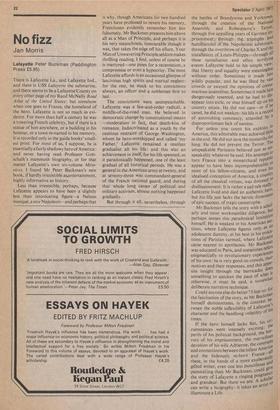No fizz
Jan Morris
Lafayette Peter Buckman (Paddington Press E5.95)
There is Lafayette La., and Lafayette Ind., and there is USS Lafayette the submarine, and there seems to be a Lafayette-County on every other page of my Rand McNally Road Atlas of the United States: but somehow when one goes to France, the homeland of the hero, Lafayette is not so much in evidence. For more than half a century he was a towering French celebrity, but if there is a statue of him anywhere, or a building in his honour, or a town re-named in his memory, it is recorded only in the guide books' smallest print. For most of us, I suppose, he is essentially a fairly shadowy hero of America : and never having read Professor Gottschalk's mammoth biography, or for that matter Lafayette's own six-volume Meinoires, I found Mr Peter Buckman's new book, if hardly irresistible asbentertainment, highly informative as history.
Less than irresistible, perhaps, because Lafayette appears to have been a slightly less than intoxicating figure—a Nelson manqué, a nice Napoleon—and perhaps that
is why, though Americans for two hundred years have professed to revere his memory, Frenchmen evidently remember him less fulsomely. Mr Buckman presents him above all as a Man of Principle, and perhaps it is his very staunchness, honourable though it was, that takes the edge off his allure. Your Man of Unwavering Principle seldom makes thrilling reading, I find, unless of course he is martyred—one pines for a recantation, a compromise or even a hypocrisy. The most Lafayette affords is an occasional glimpse of lascivious high spirits and marital neglect: for the rest, he stuck to his convictions always, an officer and a nobleman first to last.
The convictions were unimpeachable. Lafayette was a law-and-order radical, a middle-of-the-road man. He believed in democratic change by constitutional means -,-moderation in fact, that death-kiss of romance. Indoctrinated as a youth by the cautious restraint of George Washington, whom he hero-worshipped and called 'my Father,' Lafayette remained a resolute gradualist all his life: and this Was an achievement in itself, for his life spanned, as it paradoxically happened, one of the least gradual of all historical periods. He was a general in the American army at twenty, and at seventy-three was commandant-general of the French national guard, and during that whole long career of political and military activism, almost nothing happened gradually.
But through it all, nevertheless, through
the battles of Brandywine and Yorktown, through the creation of the National Assembly and Robespierre's Terror, through five appalling years of German lin' prisonment, through the triumphs arid humiliations of the Napoleonic adventure, through the overthrow of Charles X and the installation of Louis-Philippe—through all these tumultuous and often terrifying events Lafayette held to his simple vie'N' that 'liberty and equality were meaningless without order. Sometimes it made hint ,wildly popular, and he was feted by vast crowds or swayed the opinions of contumacious assemblies. Sometimes it made hinl dangerously resented, and he had to appear into exile, or shut himself up on hl.5. country estate. He did not care—or if cared, he did not weaken: his life is a record of astonishing constancy, attended bY 3 disproportionate lack of success. For unless you count his exploits in America, this admirable man achieved little in the end. He did not save the monarchY.01 long. He did not prevent the Terror. The unspeakable Parisians behaved just as unspeakably whatever he said. His attemPts t,c) turn France into a monarchical rePubbc appear to have been incomprehensible t° most of his fellow-citizens, and even his idealised conception of America, a countrY of all the classical virtues, was doomed IQ disillusionment. It is rather a sad tale reallY: Lafayette lived and died an authentic but his life just lacks the heroic dirnensi°11
of epic success, of tragic catastrophe. , Mr Buckman tells the story with a schol;
arly and most workmanlike diligence, ha perhaps senses this paradoxical limitation himself. He is weakest in his American see' dons, where Lafayette figures only as all adolescent dummy, at his best in his evocations of Parisian turmoil, where LafaYette came nearest to apotheosis. Mr BuckMan was educated in Paris, and sometimes refers enigmatically to revolutionary experiencje,sr of his own: he is very good on crowds, the motives and their responses, and this aPP°: site insight through the barricades doe: something to quicken the pace of what it otherwise, it must be said, a somewila deliberate narrative technique. Could anyone else do better? I fear so: fol. the fascination of the story, as Mt Bucknnah himself demonstrates, is the contrast he: tween the noble inflexibility of Lafayette.: character and the headlong volatility of In times. • If the hero himself lacks fizz, his e Or cumstances were intensely exciting: perils of his political background, the how rors of his imprisonment, the marvello t: devotion of his wife Adrienne, the contrasca and connections between the infant Amerill and the hideously re-born France a these, in the hands of a more exuberantlY, gifted writer, even one less punctilious ahvae painstaking than Mr Buckman, could gicv the story of Lafayette a ringing poignatt—r and grandeur. But there we are. A schottio citanmwinriatete a Life.
a biography: it takes an arti illuminate st






































 Previous page
Previous page